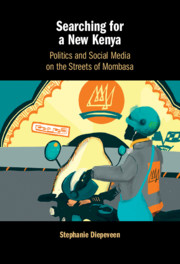Book contents
- Searching for a New Kenya
- Searching for a New Kenya
- Copyright page
- Dedication
- Contents
- Figures
- Acknowledgements
- Note on the Text
- Abbreviations
- Part I Rethinking Publics from Kenya
- Part II Characterising Publics
- Part III Situating Publics in Time and Space
- Part IV The Power of Publics
- 8 Popular Politics and Publics during the 2013 General Elections
- 9 In the Presence of Fear
- 10 The Individual Spectator and the Role of Imagination in Publics
- 11 Conclusion
- Appendix List of Interviewees
- References
- Index
11 - Conclusion
from Part IV - The Power of Publics
Published online by Cambridge University Press: 18 May 2021
- Searching for a New Kenya
- Searching for a New Kenya
- Copyright page
- Dedication
- Contents
- Figures
- Acknowledgements
- Note on the Text
- Abbreviations
- Part I Rethinking Publics from Kenya
- Part II Characterising Publics
- Part III Situating Publics in Time and Space
- Part IV The Power of Publics
- 8 Popular Politics and Publics during the 2013 General Elections
- 9 In the Presence of Fear
- 10 The Individual Spectator and the Role of Imagination in Publics
- 11 Conclusion
- Appendix List of Interviewees
- References
- Index
Summary
The concluding chapter considers this book’s implications for understanding popular politics in Kenya and the study of publics. It emphasises how potential change through public discussion in urban Kenya is more precarious than ever. Change does not neatly follow from intentional efforts to alter the terms of debate. Features that contradicted normative visions have been crucial to the power of publics to change shared imaginaries, for instance, material insecurity or elite networks. Further, social media has brought its own challenges. The conclusion finally reflects on the implications of this book for engagement with Arendtian scholarship on publics. Everyday publics in Mombasa show deeper and more varied insights into publics are possible when extending Arendt's ideas to take into account the implications of colonialism, anti-colonial struggles and postcolonial contexts. It also argues there is a need for serious engagement with the particularities of digital technology, and how they provide for a disjuncture between experience and control in publics.
Keywords
Information
- Type
- Chapter
- Information
- Searching for a New KenyaPolitics and Social Media on the Streets of Mombasa, pp. 219 - 227Publisher: Cambridge University PressPrint publication year: 2021
